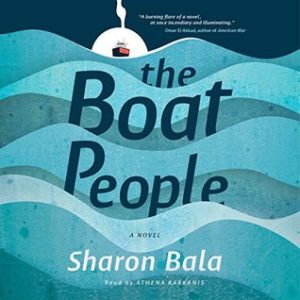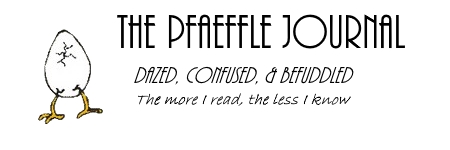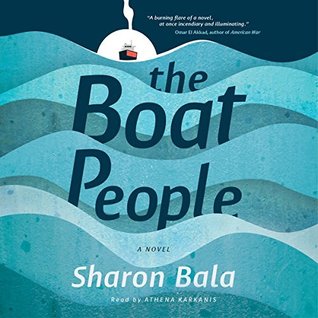 The Boat People by Sharon Bala
The Boat People by Sharon Bala on January 9th 2018
Format: audiobook
Genres: Fiction, People's history, Politics & Social Sciences
See it @ Goodreads
Synopsis
For readers of Khaled Hosseini and Chris Cleave, The Boat People is an extraordinary novel about a group of refugees who survive a perilous ocean voyage only to face the threat of deportation amid accusations of terrorism
When a rusty cargo ship carrying Mahindan and five hundred fellow refugees from Sri Lanka's bloody civil war reaches Vancouver's shores, the young father thinks he and his six-year-old son can finally start a new life. Instead, the group is thrown into a detention processing center, with government officials and news headlines speculating that among the "boat people" are members of a separatist militant organization responsible for countless suicide attacks—and that these terrorists now pose a threat to Canada's national security. As the refugees become subject to heavy interrogation, Mahindan begins to fear that a desperate act taken in Sri Lanka to fund their escape may now jeopardize his and his son's chance for asylum. Told through the alternating perspectives of Mahindan; his lawyer, Priya, a second-generation Sri Lankan Canadian who reluctantly represents the refugees; and Grace, a third-generation Japanese Canadian adjudicator who must decide Mahindan's fate as evidence mounts against him, The Boat People is a spellbinding and timely novel that provokes a deeply compassionate lens through which to view the current refugee crisis.
In August 2010, the merchant vessel Sun Sea arrived at Esquimalt naval base in British Columbia, carrying hundreds of Sri Lankan asylum seekers. Sri Lanka had been in a state of civil war for twenty-five years.
Before Sri Lanka gained independence, the British brought in millions of Tamil to work their vast cash crop plantations of coffee, and later of rubber and tea. Colonial officials brought in approximately a million Tamil speakers from India to work as plantation labor. The Sinhalese majority, resented the Tamil as the British treated them better.
Once Ceylon, as Sri Lanka was known, upon gaining independence in 1948, with the Sinhalese who were in the majority began passing laws that prohibited the freedoms the of Indian Tamils brought to the island by the British. After decades of ethnic tension, civil war broke out in August 1983, the Tamil insurgents and Sinhalese majority engaged in a bloody battle. Both the Tamil and Sinhalese were involved in committing hideous atrocities leading to some 100,000 deaths.
Canadians of Japanese descent, after the attack on Pearl Harbor in 1941 through 1949, were interned in camps across Canada. The Canadian government shut down all Japanese-language newspapers, took possession of businesses and personal property. To fund these internment, property belonging to Japanese Canadians was sold, including fishing boats, motor vehicles, houses, and personal belongings.
Sharon Bala’s uses these two occurrences as the basis of her debut novel The Boat People. This book touched me as it addressed the issue of who is the terrorist and who isn’t? How can we judge others when at times our actions have not always been pure of heart? How do politics and prejudice affect our lives?

